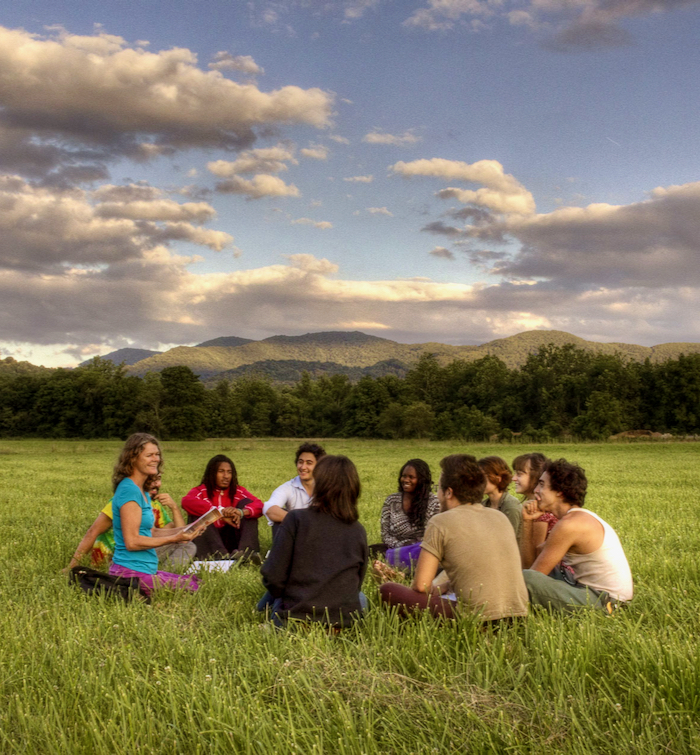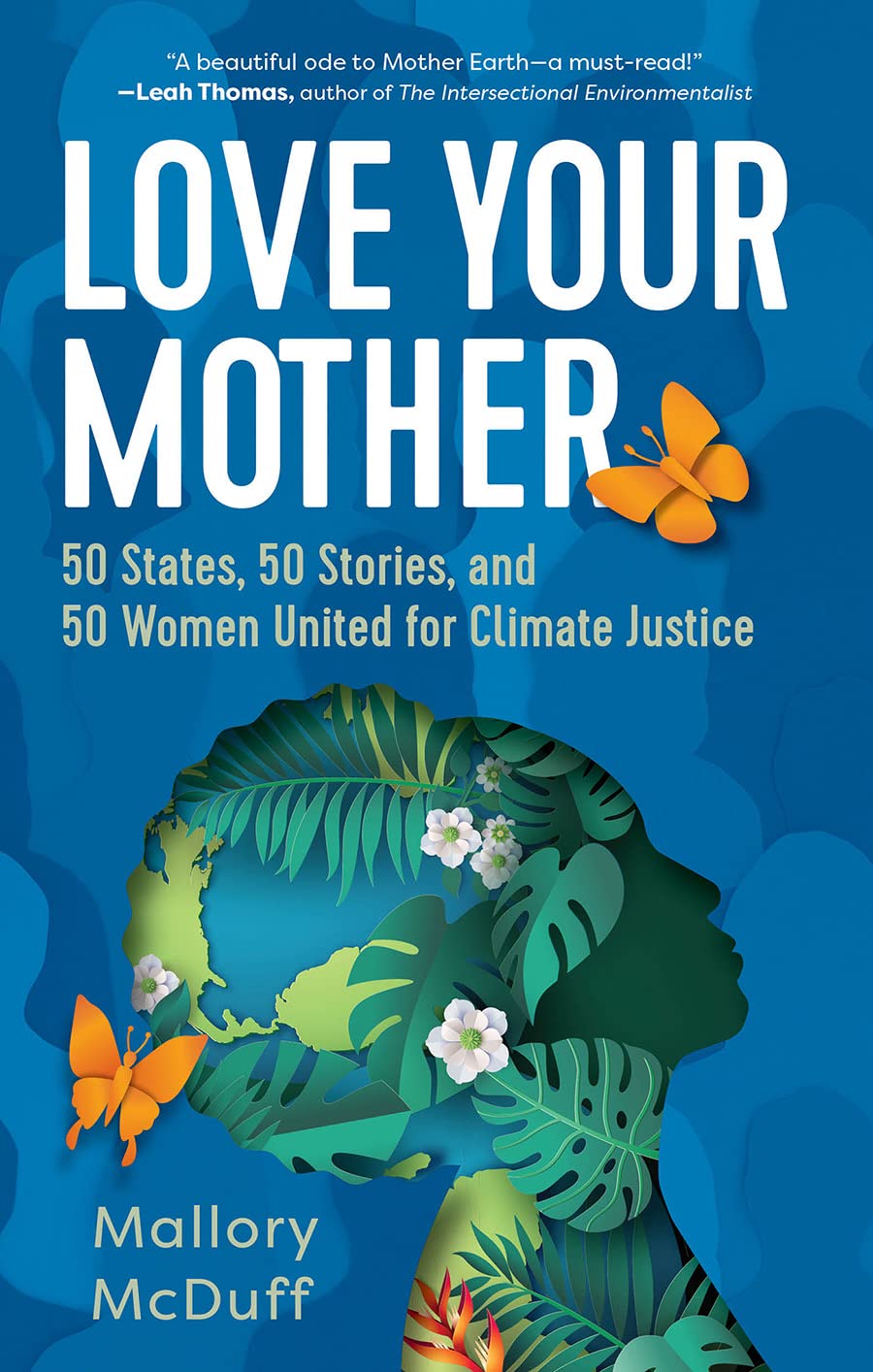
Mallory McDuff, at left, leads a class. (Photo from Warren Wilson College, used with permission of the author.)
Good People Are at Work Everywhere! Want to Help?
By DAVID CRUMM
Editor of ReadTheSpirit magazine
Empathy for each other and for our world as a whole is a value shared by our entire global network of authors and writers who have been contributing to our weekly online magazine since 2007. Our regular readers will recall our recent conversation with Barbara Mahany about discovering spiritual wisdom in the natural world, our story about Anita Nowak’s research into how “purposeful empathy” could save our planet, our ongoing coverage of Laura Elizabeth’s mission to highlight her beloved Daufuskie Island, our interview with Daneen Akers about bringing these lessons into our daily interactions with our children—and our conversation with Ann Byle about how much we can learn from … chickens.
Did you notice?
All of five of those recent columns highlight the remarkable, creative work of women.
This column is a sixth example of the strength of women in connecting all of us with our ultimate Mother, the world on which we live—and on which we hope to continue living for generations. That’s the major theme in environmental educator Mallory McDuff’s new book, Love Your Mother: 50 States, 50 Stories and 50 Women United for Climate Justice, which is available from Amazon and other booksellers.
Mallory is a person of faith, active in the Episcopal Church, but—like the other authors we continue to feature—she envisions a caring circle of men, women and children as big as the planet in all of our religious and cultural diversity.
‘How Can I Become Involved?’
In a Zoom interview about her new book, Mallory told me: “In this new book, there are stories of farmers, community organizers, elected officials, students, scientists of all different kinds, artists, sculptors, poets. I hope readers will find stories they identify with either by vocation or geography or by theme. And I hope that connecting with these stories might be a way for readers to take a next step to find out: How can I become involved?”
I completely agree with Mallory’s mission and her approach as an author. If we are going to get out of this climate crisis alive, and our grandchildren are going to have a shot at a healthy life, then we all need to help—whatever our faith or motivating principles may be.
Mallory and I both are people are faith as are many of the women you will meet in her book. However, as we talked over Zoom, I told Mallory that some of the most impressive allies in this cause who I have met and interviewed over my decades as a journalist are secularists, including self-described atheists and humanists. I have been impressed, over the years, with direct appeals that secularists such as James Gustave Speth and E.O. Wilson have made to people of faith. Both Speth and Wilson have published pointed invitations to people involved in religious movements to join hands in helping to preserve our planet. Readers who respond to such appeals by Speth and Wilson will feel right at home in Mallory’s appeals to the moral conscience of everyone—whatever our faith or secular practice may be.
I am spending this much time introducing Mallory in this week’s Cover Story, because that point needs to be stressed: We can’t allow boundaries of faith, culture or politics to keep us from recognizing the core of our shared community on planet Earth.
A Connective Prophet in Perpetual Motion
Mallory McDuff is a connective prophet who seems to be in perpetual motion, linking lives wherever she goes. I have followed Mallory’s work for a decade, since I first read her 2013 book Natural Saints: How People of Faith are Working to Save God’s Earth, published by the prestigious Oxford University Press. For that book, Mallory made a pilgrimage to 50 faith communities “with two daughters in tow,” as she puts it.
In my earlier Cover Story about Anita Nowak’s book Purposeful Empathy, one of the central findings in Anita’s research into empathy is that empathic adults usually are formed by the experiences they had as children. So, kudos to Mallory for taking her daughters on the road with her. That’s a theme echoed throughout the work of Daneen Akers and so many other colleagues.
Can you see how this circle of creative prophets connects around our world—whatever our gender or our age may be?
I mention Natural Saints, among Mallory’s many books, because Love Your Mother springs from a similar concept of searching the landscape and reporting on good news from 50 corners of the U.S. The subtitle of Love Your Mother is 50 States, 50 Stories and 50 Women United for Climate Justice.
“For this book, I did not go back out on the road again. I worked on this in the middle of COVID and I wasn’t able to go to all 50 states,” Mallory said in our interview. “I researched this book using information from sources I could access online, interviews with people by phone and Zoom. To complete the majority of this book, I was able to send each story back to the person for them to check over. Even in the research and writing, this was a case of women working collectively to share these stories.”
Finally, there is no list of 10 things Mallory expects readers to do at the end of her book. Her book has far too many suggestions to count! She gives us hundreds of things we could read, places we could visit, ideas we could pursue, people we could contact and ask to talk in our communities.
I said to Mallory, “I like that you leave us with so many choices. You’re not insisting on 1 thing everyone should do or even 10 things.”
“That’s because I really believe that it’s going to take thousands of different solutions,” she said. “The take-home message of this book for me is an awareness of so many individuals who are working in community—and that’s how this is going to change. Lots of people. Lots of solutions.
“My job as a writer and educator is to show people where they can plug in. If you’re feeling anxious about this as an individual, or if your local community is worried, then the question I hope readers of this book will be asking is: Where can we plug in with other people for collective action?”
And, ultimately, that’s the huge gift of this book: Wherever you live and however deeply connected you may be to environmental causes, I guarantee you will be surprised by some of the women you will meet in these pages. And, Mallory makes it easy to dig deeper into their work with a big resource section in the back of her book. Wherever you may be reading this column in our world, today, Mallory and I are pretty sure you can find similar good news stories by connecting with activists you could lift up as simply as sharing their social media with your network of friends.
Please, if you feel like doing a good deed in the world today, order your own copy of Mallory’s book and dig in! If you’ve got a similar story to share, we’d like to hear from you at [email protected]
If you’d like to connect with Mallory, please visit her website: https://mallorymcduff.com/

